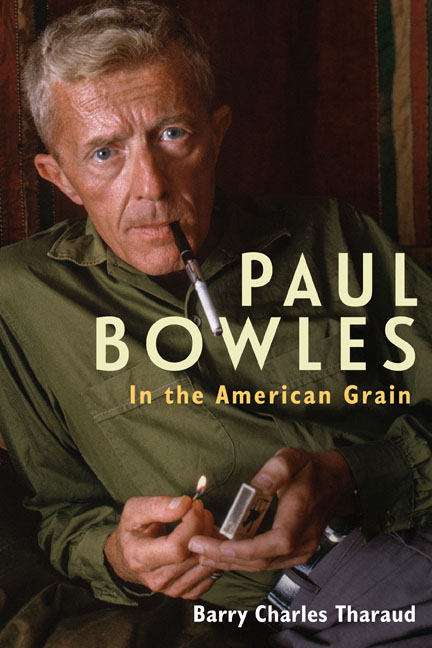Book contents
- Frontmatter
- Contents
- Preface
- Acknowledgments
- Abbreviations
- Introduction: Paul Bowles as a Canonical Writer
- 1 Paul Bowles on Intercultural Understanding: Too Far from Home
- 2 The Discovery of Existence: Without Stopping
- 3 Emersonian Shadows
- 4 Culture and Existence in Bowles’ Short Fiction
- 5 Gide and Bowles in North Africa: The Sheltering Sky
- 6 Language, Noise, Silence: Self and Society in Let It Come Down
- 7 The Spider’s House: The Social Construction of Reality
- 8 Existence and Imagination: Up Above the World
- 9 The Letters: In Touch
- Conclusion
- Bibliography
- Index
6 - Language, Noise, Silence: Self and Society in Let It Come Down
Published online by Cambridge University Press: 24 November 2020
- Frontmatter
- Contents
- Preface
- Acknowledgments
- Abbreviations
- Introduction: Paul Bowles as a Canonical Writer
- 1 Paul Bowles on Intercultural Understanding: Too Far from Home
- 2 The Discovery of Existence: Without Stopping
- 3 Emersonian Shadows
- 4 Culture and Existence in Bowles’ Short Fiction
- 5 Gide and Bowles in North Africa: The Sheltering Sky
- 6 Language, Noise, Silence: Self and Society in Let It Come Down
- 7 The Spider’s House: The Social Construction of Reality
- 8 Existence and Imagination: Up Above the World
- 9 The Letters: In Touch
- Conclusion
- Bibliography
- Index
Summary
DURING HIS EXTENDED second visit to Europe, in the spring of 1932 Paul Bowles took a side trip to Fez, Morocco, where he witnessed a crowd of several thousand adepts of one of the Moroccan religious brotherhoods, “stamping, heaving, shuddering, gyrating, and chanting, all of them aware only of the overpowering need to achieve ecstasy” (WOS, 151). Bowles comments that “Here for the first time I was made aware that a human being is not an entity and that his interpretation of exterior phenomena is meaningless unless it is shared by the other members of his cultural group” (WOS, 151). Although the autobiography where this event is related has been scoffed at as concealing rather than revealing the life that it purports to describe, as I have shown previously in chapter 2, Without Stopping is in fact a carefully constructed narrative of intellectual development that presents Bowles’ discovery and development of his basic ideas and values. An important part of Bowles’ life story is his rejection of post-Puritan New England social and cultural conditioning in order to capture the spontaneous flow of existence. However, there is another side to Bowles’ transcendental and existential individualism that is expressed in his description of the ecstatic religious procession in Fez—that is, an individual is part of a social community, which gives one's individual life meaning. Here again, we find another facet of Bowles’ life that is “in the American grain”: the individual's exploration and development of self initially takes on a trajectory away from society, but ultimately one's individuation takes on a path that finally returns and benefits society. Emerson expresses this idea throughout his writings, but the locus classicus is found in his funeral oration for Henry David Thoreau, cited near the end of this chapter. In his professional and personal life Bowles demonstrates the importance of social connections through his works of fiction and nonfiction, and through his work on incidental music for film and theater, as well as in his openness to unplanned visits from strangers and in his maintaining contacts with friends and acquaintances over the better part of eight decades, as seen in his voluminous correspondence. His second novel, Let It Come Down, is Bowles’ most extended treatment of the individual need for connectedness.
- Type
- Chapter
- Information
- Paul BowlesIn the American Grain, pp. 127 - 142Publisher: Boydell & BrewerPrint publication year: 2020



